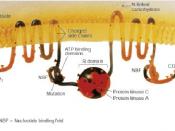Cystic fibrosis (CF) is a chronic, progressive, and frequently fatal genetic disease of the body's mucus glands. CF primarily affects the respiratory and digestive systems in children and young adults. Sweat glands and the reproductive system also are usually involved. On average, individuals with CF have a lifespan of about 30 years.
CF is an autosomal recessive disorder caused by mutations in the CFTR (cystic fibrosis transmembrane conductance regulator) gene. Heterozygous carriers are asymptomatic. Two altered genes must be present for CF to appear. This means that if both parents were CF carriers, their offspring would only express CF symptoms if they had inherited one defective copy of the CFTR gene from each parent.
According to data collected by the Cystic Fibrosis Foundation, about 30,000 Americans, 3000 Canadians, and 20,000 Europeans have CF. Although it affects all races and ethnic groups the disease occurs mostly in whites whose ancestors came from northern Europe.
Also, it is less common in African Americans, Native Americans, and Asian Americans. About 2500 babies are born with CF each year in the United States. Also, about 1 in every 20 Americans is an unaffected carrier of an abnormal CF gene. These 12 million people usually are unaware that they are carriers.
CF does not follow the same pattern in all patients but affects different people in different ways and to varying degrees. The basic problem, however, is the same--an abnormality in the glands that produce or secrete sweat and mucus. Sweat cools the body; mucus lubricates the respiratory, digestive, and reproductive systems and prevents tissues from drying out, protecting them from infection.
*Loss of excessive amounts of salt in sweat can upset the balance of minerals in the blood, which may cause abnormal heart rhythms. Shock also is a risk.
*Thick accumulations of mucus in...


